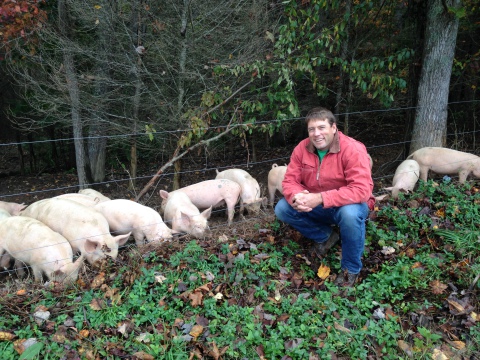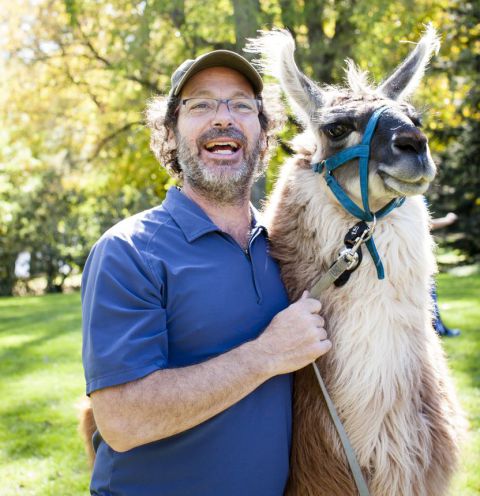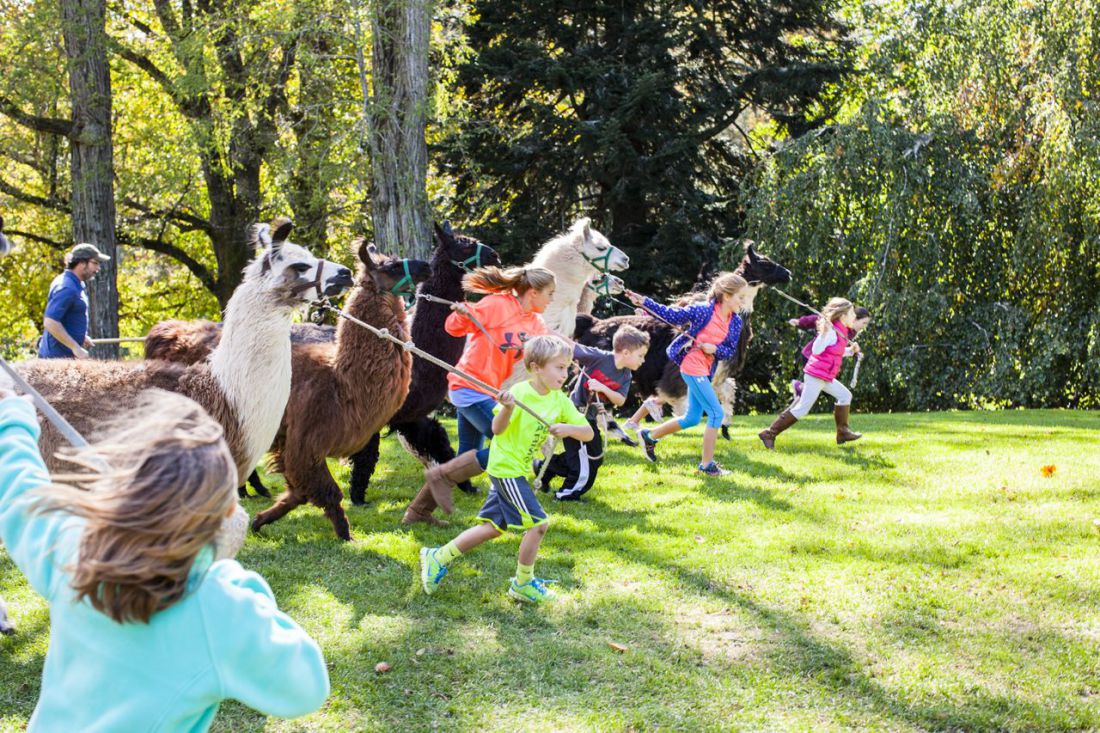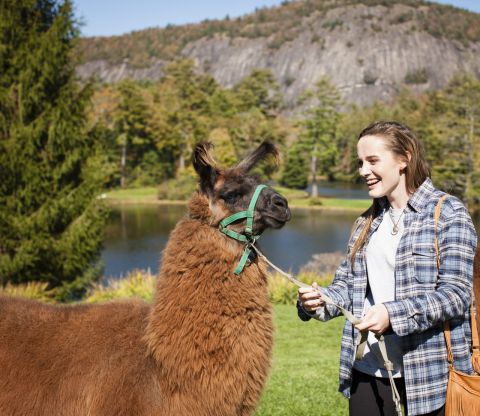Jamie Ager walks up to cow No. 714 and scratches behind its big, black ears. Gray and purple clouds roll over the pasture as the animals feast on clover and grass. There’s a nip in the air, and it feels like fall on this October morning at Hickory Nut Gap Farm in Fairview.
“They become like family,” says Ager, running a hand down the cow’s thick neck. The fourth-generation farmer and his wife, Amy Ager, co-own both the farm operation and Hickory Nut Gap Meats.

North Carolina is home to over 50,000 farm operations; in 2012, livestock sales poured $8.3 billion into the state’s economy. And one way or another, the livelihood of many Western North Carolina families is tied to such large, domesticated animals. But whether the objective is food, fun, health or therapy, these farmers often seem to have what amounts to a symbiotic relationship with their livestock.
“I always say if you’ve had a stressful day, just go sit with the cows and chill,” advises Ager.
The 600-acre farm is home to 60 steers and 500 pigs as well as turkeys, chickens and a handful of goats. The animals consume only their mother’s milk plus what they find while foraging and grazing. As a result, there’s no need for antibiotics or growth hormones.
Ager and his wife met as students at Warren Wilson College and took over the farm operations 12 years ago. The reasons, he says, were simple: to put food on the table and help people connect with their food sources.
Gesturing toward his hogs, Ager says: “They’re rooting in the ground; they’re having a good time. You can feel it.” The pigs’ charm is palpable: They snort and root, their pink snouts disappearing into the mud. And when asked about slaughtering them, Ager doesn’t flinch.
“Life’s a circle,” he says. “There’s a time for every season.”
Society, notes Ager, has many ways of separating “food” from the reality of animals being killed. But growing up, he says, the family had “chicken-killing day,” which was less about trauma or discomfort than about impressing his uncles with his ability to wring a turkey’s neck.
“It was a coming of age,” Ager explains.
He knows his animals live a good life, and he’s proud of that — and of their role in linking people to their food sources and facilitating better land management.
“I want people to understand it, to know it,” he says. “We take seriously that we’ve chosen a vocation trying to create better food systems. It’s a journey that’s worthwhile to be on.”
Building trust
Tim Gallaugher of Down to Earth Farm in Marshall wasn’t raised in the business, but his dad grew up on a dairy farm in California, and Gallaugher’s wife, Andrea Van Gunst, was reared on a cattle farm. Together they raise 17 sheep, some chickens and 2 acres’ worth of vegetables.
The sheep are the newest additions to the family. “I’ve always loved sheep,” says Gallaugher. “I knew I wanted to raise some sort of critters.”
But the thought of raising animals for slaughter didn’t sit well with him, and the couple decided on dairy sheep, with plans to eventually make and sell cheese. They chose sheep because of their smaller size, sweet demeanor and milk, which he says is high in butterfat and tastier than cow’s or goat’s milk.
To Gallaugher, raising sheep for meat “feels like a betrayal,” he explains. So far, he hasn’t brought any animals to a slaughterhouse, he reports, because he cares not only how his animals live but how they die.
In October, however, Gallaugher and Van Gunst tied the knot in a small ceremony at a summer camp in Flat Rock, and their wedding feast featured a sheep from their farm. They slaughtered it on-site following halal (traditional Islamic) guidelines, with help from a few friends who had experience in killing, hunting and cleaning. “Overall the process felt really good, because we all approached it with such seriousness and reverence for what the animal was giving,” Gallaugher reveals. “It felt honorable; clean.”
For the same reasons, he likes spending time with his sheep, watching them interact. “They’re playful and joyous. It’s just fun to figure out how to earn their trust so they want to come over and see what’s going on, rather than running the other way.”
The Llama Guy

Deep human/animal connections also loom large at SOAR, a boarding school, camp and adventure program serving adults and children with attention deficit hyperactivity disorder or learning disabilities.
Established in 1977, SOAR features a long-running llama trek program that takes kids ages 8-10 on a four-day hike in the Panthertown Valley. “Because kids with ADHD and learning disabilities struggle with feelings of isolation, social skills and peer relationships, having an animal they can connect and bond with can be a powerful thing for them,” says Laura Pate, the camp’s director of operations. The llama, a traditional Andean pack animal, is a close relative of the camel.
At the end of the trek, the llamas head home with their owner, Mark English. Known to most as “The Llama Guy,” English says his childhood experiences on the golf course were what gave him the idea of having llamas do the work instead. “Even as a little kid, I loved to caddie but thought how nice it would be to have llamas carry everything,” he recalls.
After a stint at Brevard College in the 1980s, English studied at Penn State University’s Center for Turfgrass Science and spent 25 years as a golf course superintendent. He finally realized his lifelong dream of owning llamas in 2007, when he bought his original five — for more than $1,000 apiece. English was helping out at the Sherwood Forest Golf Club in Cedar Mountain, and he asked the club’s board if he could bring his new pets in to caddy.
“They laughed,” he recalls, but they gave him the go-ahead. His llamas were a hit, and pretty soon, they were getting guest spots on the Animal Planet network.
When caddying, the llamas split their time among Sherwood Forest, Maggie Valley Club & Resort and High Hampton Inn & Country Club. When they’re working, there are eight animals on the course at a time, each caddying for two golfers. “It’s quite a show,” notes English.
But these animals are more than just entertainment to English, who’s now back at Brevard College pursuing a degree in wilderness leadership and experiential education with hopes of soon becoming “a full-time llama guy.” Like the kids at SOAR, he believes in the llamas’ healing power.
“I’m still fascinated with them every day,” he reveals. “I have such confidence in them: I know what they’re going to do and when to put on a good program.”
On a recent Saturday, the llamas are on hand for an Oktoberfest celebration at High Hampton in Cashiers. They’re gentle and easily led by means of small harnesses around their muzzles.
Sporting a scruffy beard, a cap and shorts with a scrub brush dangling from the back pocket, English dashes back and forth among his llamas and the unassuming kids and teenagers he’s plucked from the crowd to lead them. Gently waving a bamboo staff at the crowd, he proclaims: “Come on, llamas! Come on, humans!”
And so the llama parade begins — weaving in between the festival tables as old-time Bavarian music plays. A crowd forms, delighted by the animals’ woolly fur, thick lashes and puckish ears. Amid the chaos, though, the llamas seem more interested in the fresh, new grass than in the humans.
A family squeezes around one of the animals to take a photograph, English whistles, and the animal perks up. Like a proud father watching his kid perform, English looks at his regally posed llama, grins, and says to the group gathered behind him, “Isn’t he perfect?”






They become like family. .and then you kill them? He’s proud of how he wrings a turkey’s neck? Sociopath alert.
How disturbing that Jamie Ager of Hickory Nut Gap Farm claims that the very animals he continues to exploit “become like family” to him. I can tell you, I certainly wouldn’t wish to be included as “family” alongside someone who routinely manipulates, exploits and then murders his own so-called “family” members. How disgusting and vile. Tell it like it is, Jamie. You’re making a buck from exploitation and continued bloodbaths. Horrific!
It did seem like a poor choice of words– tho I suspect the context is missing. There’s a huge difference between feedlots and small farming. The small farmer faces more intimately the process of caring for the individual living animal that s/he will one day kill.
It would seem to me that this is an ultimate betrayal of “friendship”. To gain the trust of another and to act like you care only to bely that very friendship with the treachery and violence of murder. What dysfunction to harbor such compartmentalization of true compassion. There is no compassion in betrayal and murder.
Read this short article and consider the mass sickness of a society that deems senseless abhorrent violence to some feeling beings as being “perfectly fine.” Shame on such cruel indifference in regards to the plight of feeling beings. http://www.truth-out.org/opinion/item/26983-animals-die-woman-cries-but-we-are-unmoved